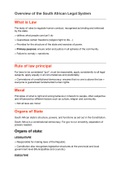Summary
Summary week 1 and 2 CML1001F Business Law I (CML1001F)
- Institution
- University Of Cape Town (UCT)
Summarised notes of business law 1 week 1 and 2 based on the lecture notes published by the lecturers during 2021 physical distanced learning.
[Show more]



